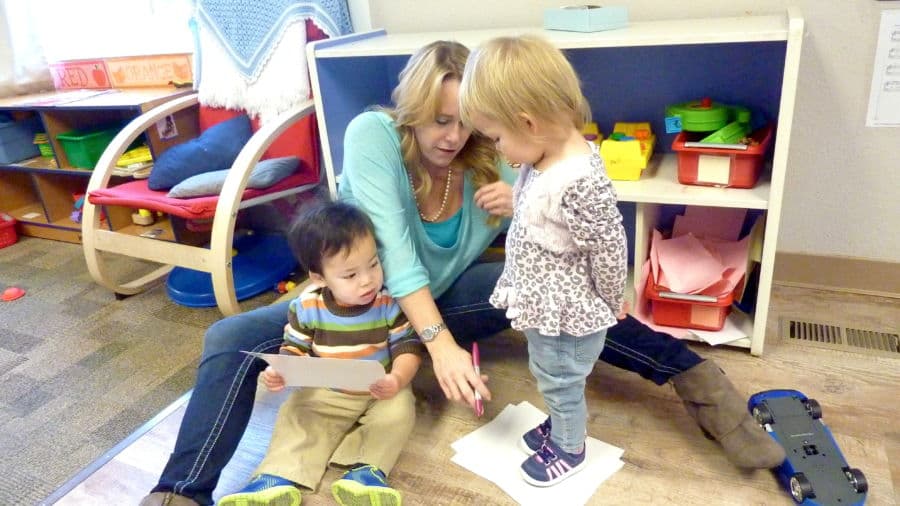
By Ann Schimke, Chalkbeat
Child care teachers and assistants absolutely deserve the raises that come from Colorado’s new minimum wage of $10.20 an hour, their bosses say, but the pay increases also mean that many providers will pass on the new expenses to tuition-paying parents already stretched thin by child care costs.
“I don’t know how much more parents can pay,” said Diane Price, who heads a nonprofit network of seven centers in Colorado Springs.
In some parts of the state, early childhood advocates also worry that the raises mandated by the minimum wage hike will cause some workers to lose public benefits by pushing their income just above the eligibility threshold — making it harder, not easier to make ends meet.
In a field working to professionalize its ranks, pay its workers more, and raise awareness about the educational and economic value of quality child care, many observers say the minimum wage increase is a step in the right direction.
“It’s an important move,” said Christi Chadwick, director of the “Transforming the Early Childhood Workforce” project at the nonprofit Early Milestones Colorado. “The thing I struggle with is we’re still not getting people out of poverty and paying them on par with the public school system.”
Price, the president and CEO of Early Connections Learning Centers, said, “Shame on us that we even have to have this discussion that early educators are in a category that pays minimum wage.”
The latest minimum wage increase, which took effect Jan. 1, is the second of four annual increases mandated by a ballot measure approved by Colorado voters in 2016. The last step of the phase-in process will boost the minimum wage to $12 in 2020.
Colorado is among 29 states — most in the northeast and west — that have set a minimum wage higher than the federal rate of $7.25 an hour, according to the U.S. Department of Labor.
Child care providers here say advance planning and clear communication with parents have helped them incorporate raises into their budgets.
Price, who raised tuition slightly at her centers last August, said she anticipates a budget hit of about $600,000 over the four-year phase-in period.
But that’s not just because her lowest paid staff members are getting raises to comply with the minimum wage law. Like many other child care directors, she’s giving raises across the board out of fairness to veteran employees.
Price said she didn’t want entry-level employees to catch up with those who already hav a Child Development Associate credential or an associate’s degree.
Heather Griffith, who leads the for-profit Young Peoples Learning Center in Fort Collins, is taking the same approach. Her whole staff, except two brand new employees, have received raises.
She’s already sent out a letter notifying parents that tuition will go up 6.5 percent on February 1 – that’s an additional $16 a week for a full-time preschool slot. It’s the second of three tuition hikes Griffith will institute during the minimum wage phase-in period.
While the higher costs are hard on parents, “it’s a lot tougher for these teachers to survive on non-livable wages,” Griffith said. “I’m 100 percent in support of this minimum wage hike.”
Griffith hasn’t gotten much pushback over the impending tuition increase. The thriving economy helps. Also, she said, parents like the care her centers provide and wouldn’t be able to find it for much less unless they switched to unlicensed care, which is mostly unregulated.
Anne Lance, who heads the non-profit Teaching Tree Early Childhood Learning Center in northern Colorado, said she began planning — and frontloading — wage increases for all staff shortly after the 2016 ballot measure passed.
Currently, her entry-level teaching assistants start at $10.50 an hour even though she’s only required to pay $10.20.
“I had to get way ahead of the game … so in a couple years when it gets closer to that $12, it’s not going to kill me,” said Lance, who operates one center in Loveland and one in Fort Collins.
While the center’s two sites serve many low-income children who qualify for state child care subsidies or state-funded preschool slots, there are some tuition-paying families in the mix, too.
It’s those parents who may feel the sting of the minimum wage increases over the next couple years. Lance said she’ll keep her tuition increases to a modest 3 percent this year, but may have to jump up to 5 percent in 2019 and 2020.
On average, lead teachers with several years of experience at Teaching Tree make about $13.50 an hour. While that’s above the minimum wage, it’s not much to live on for employees on their own or those who are single parents, Lance said.
In Colorado, about one-third of child care teachers qualify for some kind of public assistance to cover housing, food, health insurance, or child care costs, according to a 2017 survey of child care workers in the state.
Chadwick, of Early Milestones, said during visits last fall to the San Luis Valley and southeastern Colorado, early childhood leaders explained that some child care workers were quitting their jobs due to fears they would lose government benefits when minimum wage-related raises took effect.
To alleviate such concerns and make child care a profession that pays a living wage, more substantial raises are needed. But Chadwick and other leaders don’t expect further funding to come from a state-level effort.
Instead, they say it will be locally-funded initiatives — already underway in some Colorado communities — that pick up the slack.
“We have to pass things like mill levies and taxes that support early childhood,” said Griffith, of Young Peoples Learning Center. “We have to do it. We have to say yes to these things if what we want is a community that has educated kids ready to go into kindergarten.”
Chalkbeat is a nonprofit news site covering educational change in public schools.












